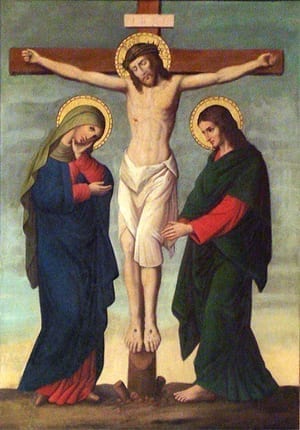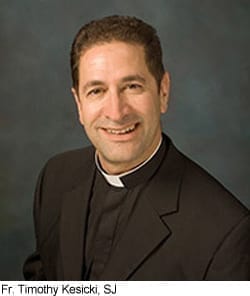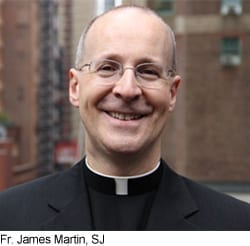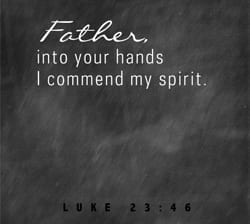April 7, 2023 — As Jesus hung on the cross, he uttered seven last phrases of great meaning to those contemplating his passion and death. Today, on Good Friday, we remember his Seven Last Words, which have been widely used in Good Friday homilies.
The tradition was begun in the 17th century by a Jesuit priest in Peru. He developed a service of meditations for Good Friday based on the last words of Jesus, and the devotion spread around the world. Jesus’s last words, as recorded in the Gospels, became part of the church’s Lenten tradition.
The Seven Last Words are traditionally part of a Good Friday service and often include some element of music, prayer or reflection. Most churches choose seven different speakers. At St. Ignatius Church in New York City, Good Friday’s Seven Last Words devotion will include a variety of perspectives. The Jesuit church has invited a Lutheran pastor, an Anglican rector, a lay teacher from Loyola School in New York and a Jesuit priest, among others, to reflect on the words Jesus spoke from the cross.
Father Timothy Kesicki, SJ, director of the Campaign for Descendants Truth and Reconciliation Trust and Foundation, has also preached on the subject. “When we suffer the most … we can cry out and God will save us,” said Fr. Kesicki of Jesus’ last words, “My God, my God, why have you forsaken me?”
“Jesus is on the cross; his nerves, his body, his blood, his anguish is ours. And in the midst of this excruciating pain he makes the ultimate confession: There is a God and God will hear me. How many times have we allowed ourselves to bear the depth of our soul to God?”
Fr. Kesicki recalled meeting a recent widower on his way out of church. The man told Fr. Kesicki that he was “angry at the big guy.” Fr. Kesicki pointed to the doors of the church and said, “The walls inside those doors are built for screaming. God wants all of you, so let God know how you feel. How else will he know the depths of your love?”
(Image via www.marionfumc.org)
Fr. James Martin, SJ, bestselling author and editor-at-large of America Media, has also delivered homilies on the Seven Last Words on Good Friday. The homily Fr. Martin gave at St. Patrick’s Cathedral in New York City became the basis for his book “Seven Last Words.”
In the book’s introduction, Fr. Martin said, “If there is an overarching theme in my own reflections, it is the way that Jesus’ sufferings help him to understand us. … The person to whom we pray, the man we hope to follow, the one who is risen from the dead, understands us — because he lived a human life, and one that, particularly in his final week, was filled with suffering.”
Fr. Martin hopes Jesus’ words on the cross invite us to a deeper friendship with the Savior. And he wants people to remember that “Good Friday was a single day in Jesus’ life. In other words, Jesus’ life was not all suffering and pain.”
That theme is echoed too by Fr. Kesicki, who sees the triumph of the human spirit even in the face of death in Jesus’ last words. “As long as there is a single man, woman or child on earth with the grace to be changed by this self-emptying love, he or she can take up the cross and follow him.”
Jesus’ deepest yearning, said Fr. Kesicki, was “to complete what he had been born to do. More than anything else in life, he wanted to die for us, out of pure unconditional love for us.”
Click on the links below to listen to each part of Fr. Kesicki’s reflections from his Good Friday homily or find them all on iTunes.
The Seven Last Words
“Father, forgive them, for they do not know what they do.”
“Today you will be with me in Paradise.”
“Woman, this is your son” . . . “This is your mother.”
“My God, my God, why have you forsaken me?”
“I thirst.”
“It is finished.”
“Father, into your hands I commend my spirit.”[Sources: Loyola Press, U.S. Catholic, The Word Among Us]
Do you want to learn more about vocations to the Society of Jesus? Visit www.beajesuit.org for more information.





